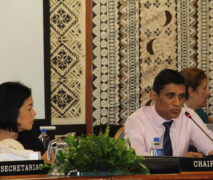Deputy Secretary-General, Pacific Islands Forum Secretariat
Pacific ACP Senior Trade Officials
Representative of the CROP Agencies
Representatives of Technical Agencies and Development Partners
Ladies and Gentlemen
Bula Vinaka and welcome to the Pacific ACP Trade Officials’ Meeting.
Please allow me to extend a special welcome to the Pacific ACP Trade Officials, who have travelled from across the region for this meeting.
It has been some time since we last convened the Pacific ACP and Forum Trade Meeting. That makes hosting you all here in Fiji, and in particular to this meeting, all the more special.
Colleagues, ladies and gentlemen,
As you all know, the Pacific ACP grouping was created through our relationship with the European Union (EU), and espoused by previous Lomé Conventions and the Cotonou Agreement.
This Grouping was actively formalised to negotiate and deliver a WTO compatible Economic Partnership Agreement (EPA) for the Region, which commenced in 2004. But since the suspension of the Pacific-EU Comprehensive EPA negotiations, in 2015, the Pacific ACP Group has lost its mandate and drive and has met only on an ad-hoc basis.
Despite this, the PACP is still regarded the most appropriate forum to discuss issues that are common to our island communities, and there are many reasons but primarily due to our proximity, shared history and culture, and commonality of our challenges and opportunities.
PACP meetings present a safe and open environment, where our Ministers and Leaders can deliberate issues that move our countries forward. This is especially true in the face of challenges posed by global issues such as, climate change, the present global economic downturn, depletion of natural resources, as well as, the perennial issues of distance and connectivity.
Hence, this meeting will also consider the future of the PACP Group and its members.
Colleagues,
Since the last PACP meeting, a lot has happened in the global arena. The trade war between the United States and China has weakened the global economy. The United Kingdom has formally left the European Union (Brexit). Instabilities in the Middle East, Asia, and Latin America intensify public anxiety. The WHO declared Coronavirus, an international public health emergency and the impact of climate change is becoming ever more pronounced than ever before.
Global economic growth shrank from 3.7% in 2018 to 3.2% in 2019, reflecting the link between trade and geopolitical tensions.
Colleagues, ladies and gentlemen,
Amidst these global phenomena, we need to maintain our bond and solidarity. In times of adversity, there is greater need to become a stronger and closely knitted group. A Grouping that is a lucrative trading bloc. In this regard, we need to start with the implementation of our regional trade agreement.
The Pacific Island Countries Trade Agreement (PICTA), is the only formal Trade Agreement that provides a pathway to bind our region into a strong trading bloc, as was envisaged by our Leaders’ way back in 2003. Currently, only 7 out of 14 FICs have implemented the agreement. I am sure you are all aware the state of the agreement bears direct correlation to that of our integration. We cannot afford to let this Agreement fail.
Colleagues, ladies and gentlemen,
With regards to EPA, Post Cotonou and our trade and development relations with EU, I call on us to relook at these issues with vigour and devoid of any remnants of fatigue and frustrations of the past.
We need to question the current balance of our relationship with the EU when considering committing to the EPAs and negotiating the successor to the Cotonou Agreement. The EU has been a crucial development partner in the Region. However, they have also taken harmful unilateral actions in declaring some of our tax jurisdictions unfavourable and our fisheries unsustainable.
Going forward, we would like to see a change in the dynamics of our relations, which should be based on mutual respect and equal partnership.
Colleagues, ladies and gentlemen,
We need not limit ourselves to our traditional trading partners. We need to harness the opportunities presented by the Asian region. In fact, the centre of the global economic gravity has moved towards the Asia-Pacific region.
Twenty years ago, China’s economy was one-tenth the size of the United States. Today, it is two-thirds as big. Based on the current trajectory, China will be bigger than the U.S. by 10% in the next twenty years. India will have leapfrogged Japan and Germany to claim the third spot in the global rankings.
Therefore, we need to develop regional strategies to approach and engage these markets.
Our interest should not only be limited to gaining access to their markets, but attracting FDIs, expertise, knowhow/technology and development aid, whilst protecting our markets and ability to develop new industries.
Colleagues,
Whilst we focus on trade, we are all aware that our region is facing unprecedented threat by worsening Climate and rise of NCDs. Well-developed trade policies could play a positive role in combating these challenges, given their imminent threat to our economies and our people. We need to be proactive in setting and adopting polices that are cognizant of issues such as public health, environment and climate change.
Colleagues, ladies and gentlemen,
To conclude, as Trade Officials, it is our responsibility to work in a collective manner and come up with innovative, tangible and ambitious recommendations for our Ministers. These recommendations need to set the foundation from which the PACPS can take a leap towards a bigger and brighter future.
With these words, I now call upon the Deputy Secretary General to deliver the introductory remarks.
Vinaka vakalevu.



